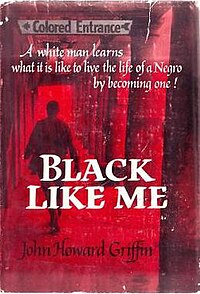 I have been hiding in my cloak of whiteness for most of my life. I have not been exposed as a Hispanic woman because the shade of my skin is light and my English doesn't have an accent. When I was a kid my closest aged cousins would mock me because I spoke like a "gringa." I have been able to live a white privileged life and now that my last name is Gaurkee, my cloak has become thicker and harder to penetrate.
I have been hiding in my cloak of whiteness for most of my life. I have not been exposed as a Hispanic woman because the shade of my skin is light and my English doesn't have an accent. When I was a kid my closest aged cousins would mock me because I spoke like a "gringa." I have been able to live a white privileged life and now that my last name is Gaurkee, my cloak has become thicker and harder to penetrate. I have been thinking a lot about race lately. I have new role at school as the diversity director and part of my job is to think about these things and to encourage students to have conversations about all kinds of diversity. I have been thinking about my latina-ness. When I close my eyes and I think of "Latina" I think of a girl with very slick dark brown (almost black sometimes) hair parted to the side, red lipstick on her pouty lips and large hoop earrings. I should say that no one in my family actually looks like this but that's what I think of. I have never identified with that image and thus I have side stepped thinking about it for almost 37 years.
As a parent, I am very well aware of the importance of race. Last summer I read, Nurture Shock, a life changing book for me (friends can tell you because I couldn't stop talking about it) which has a chapter discussing race. Studies show that by the age of 3 most kids have already developed their ideas of race and discrimination. The white educated upper middle class families assume that if we don't talk about race that the impression that we give our children is that race doesn't matter and that everyone is accepted. However, omission of dialogue is just as bad. What happens if we don't talk about it then our kids have a more animalistic reaction of sticking to "their own kind." In the wilderness, similar animals stick together to protect themselves from the unknown. These studies have influenced me to talk to my kids about race. Lydia and I aren't reading through Black Like Me or the "I have Dream Speech", but when we watch Doc McStuffins I ask her what color she is, she tells me she's brown and I say, We like brown people, matter of fact we like people of all colors. When we watch Sesame Street, I ask her did you know Burt and Ernie are both boys? And then I tell her they live together and that's okay.
 We read books about Asians, Blacks, Hindus, Jews, Christians and so on. We talk about other cultures, does that make Lydia inherently better than other 2 year olds, no but it does plant a seed that I hope some day grows into a strong woman that respects and appreciates differences among people of the world regardless of race, gender, sexual orientation, socioeconomics, ethnicity, age, ability or religion.
We read books about Asians, Blacks, Hindus, Jews, Christians and so on. We talk about other cultures, does that make Lydia inherently better than other 2 year olds, no but it does plant a seed that I hope some day grows into a strong woman that respects and appreciates differences among people of the world regardless of race, gender, sexual orientation, socioeconomics, ethnicity, age, ability or religion.In my current reading of Why do All the Black Kids Sit Together in the Cafeteria?, another study about young children presented the same information about children carving out their social groups by the age of 3. What I found this time was almost more influential. I have been living as simply white because of the advantages it brings me. I can run into a store with my sweats on and no one is suspicious of me, I can turn on the TV and see people that look like me, when I go by my daughters a doll I can easily find one that looks like them and when I move into a neighborhood people don't fear their property values are going to drop. What's the problem? There is a huge part of my identity that I negate because of the advantages.
I will likely never know what it really feels like to the the minority that I am, however I can make strides in understanding the impact of it. I will likely never know what it feels like to be an immigrant, but I can open myself to the experiences of my family. I will likely never know what it is like to raise my children in a place that doesn't quite fit in a language different than my native one, but I can appreciate my parents for doing it. I can do these things my continuing the conversation with my daughters everyday.
No comments:
Post a Comment